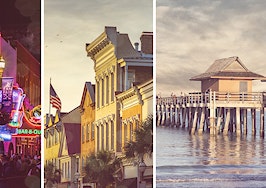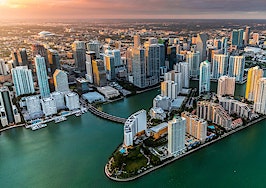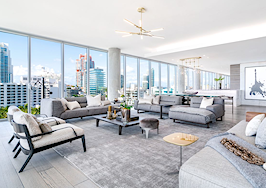Miami’s luxury market, which has long been associated with international homeowners and gated islands, is facing a unique situation amid the pandemic.
At the moment, Florida is behind only California as the state with the most coronavirus cases in the U.S. and, as of Thursday, had surpassed a half-million confirmed cases. But defying analyst expectations, luxury markets in parts of the state — such as Palm Beach, where inventory is low and demand is high — are seeing transactions surge and prices rise. Meanwhile, in Miami, sales prices are dwindling as homebuyers interested in city living are swiftly decreasing, real estate agents and experts told Inman.

Peter Zalewski
Indeed, Miami has seen headline-grabbing luxury sales, yet a number of signs point toward problems in the market, Peter Zalewski, a licensed broker and head of the Miami real estate consulting firm Condo Vultures, told Inman.
Between April and June 30, according to a recent One Sotheby’s Realty report, the number of single-family home sales in the Miami-Dade County dropped by 5 percent while the number of condo sales dropped by 45 percent, even as sales prices surged by 22 percent for homes in the $1 million plus bracket and 43 percent in the $5 million plus bracket. In July, however, sales activity came rolling back to life, with both single-family and condo sales spiking, according to a new Douglas Elliman report. One problem, however, is that sales prices are now steadily falling, Zalewski said.
“If you want to get a deal done, there’s not enough buyers and there’s way too much product,” Zalewski said. “What do you have to do? Well, if you consider all real estate a commodity, you cut your price.”
Social media influencer Gianluca Vacchi purchased a Miami Beach mansion for $24.5 million, which was listed for $27 million, while hedge fund manager Cliff Asness unloaded a penthouse in the same part of the city for $22 million, a 15 percent drop from what he paid for it in 2018. A report from Florida Atlantic University professor and real estate economist Ken H. Johnson found that Miami home prices are overpriced by more than 20 percent – the highest overvaluation the city has seen in more than eight years.
“Prices are not expected to continue to rise as quickly as they used to,” Johnson told the Miami Herald. “They will likely stay the same or see year-over-year growth increase by 3 percent or 4 percent instead of the 6 percent or 7 percent that we’ve seen in the prior years.”
Many of the problems facing Miami are the same as in any other big city across the country — a desire to get away from dense urban areas and into suburban and rural spots with more space. But there are considerations unique to Miami that may create the appearance of a hot market that, in actuality, disguises problems.

Jay Phillip Parker
“The reality is that [buyers] hold the trigger and are looking to chisel down anybody selling,” Zalewski said. “Stats might suggest that sales are up. What they don’t suggest or reflect is what kind of a discount a seller is accepting in order to move properties.”
Climate change has long threatened the city, which sits at sea level and has been called “ground zero,” and raised the cost of insuring a property. Foreign buyers, many of them from South America, made up 63 percent of the city’s real estate market last year. When the virus hit, many of the foreign sales that would have taken place had been put on hold amid travel restrictions into the country.
“We’ve seen a drastic shift in the market in terms of where the buyers are coming from and why they’re coming,” Jay Phillip Parker, the chief executive of Douglas Elliman’s Florida brokerage, told Inman. “I think this is going to drive the velocity, the value and the sustainability of what we’re seeing now in Miami.”
But even among the uncertainty, Parker has seen an explosion of clients from other regions in the U.S. looking to buy or rent in Miami and remains very confidently bullish on the state of the market. The reason for that, he argues, is because of Miami’s lifestyle and desirability as an ocean city that will outlive the pandemic.
“I believe that what we’re doing will work and I believe that ultimately we’ll get past the coronavirus,” Parker said. “At the backboard, I think we’re going to see a real evolution furthering the strength and support of the South Florida market.”













